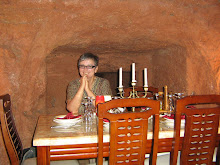This is the footpath on the corner of Merchant St and Archbishop St. It is just up the road from the Merchant St entrance the the Valletta campus of Malta University, a beautiful old building that is part of the fabric of the Knight's city.
I could write this blog about the lack of consideration for pedestrians in Valletta. I could write about how pedestrians are at the bottom of the list in sharing the streets. I could write about the lack of a coherent design for pedestrian routes around the city.
Instead, I'm going to be specific.
I was overjoyed when MUZA unveiled their designs for their new venue in Auberge d'Italie. Sandro Debono, a guiding light for the shift of the Museum of fine Arts from South St, talked about the significance of story in curating and of community engagement. But my joy lay in the plan to enable a walking route through the courtyard of the museum from La Vallette square to Merchant St. At last someone was giving consideration to the concept of the streets as the connecting life of the city. Imagine the wonder of a stroll through City Gate, under the new Parliament House, past the back of St James Cavalier, across the back of Teatru Piazza Rjal, across La Vallette square, into MUZA for a coffee, across the courtyard and out on Merchant St, stroll the length of the street past the newly refurbished Is-Suq and the back of the Cathedral and Palace and then...
The flaneur arrives at the photo above.
So, imagine my joy last year when The University of Malta beautifully restored their Valletta campus and re-opened the connecting passage through from Merchant St to St Paul's St. The space became a delightful linking haven away from traffic with occasional exhibitions to raise awareness of the University as a cultural institution engaging with the local community. The University became part of my cultural map and during the week, I walked through with my groceries and greeted the security people on the desk. Here was a cultural and academic institution that was part of the community and part of my life.
Until last week. I resolutely struggled through the bikes and cars above and turned into the entrance to the University. The glass doors were closed and a sign demanded that I ring the bell for assistance. I did, and the door opened. I walked through into the calm space and smiled at the security person who had left her desk and was walking towards me.
"You will have to stop doing this," she said, "You can't just walk through with your shopping bags."
I tried to counter my disbelief by talking about engaging with the Valletta community, about the value of a calm space away from traffic, about a campus that opened out to the community.
"But we are a prestigious institution," she said, "There are plenty of other routes that you can use."
And of course I will use them but my sadness is about an opportunity missed, a chance lost to create Valletta as a city were cultural institutions work with the local community to develop pedestrian routes that are safe and pleasant and build our social capital. Instead, the privileged world of the academic is separated from the everyday life of a working city. A pity.
I tried to post a short version of this blog on the Valletta campus FB page but it didn't get past the gatekeepers.
Tuesday, August 30, 2016
In and Posting
Using Firefox instead of Safari and suddenly I'm in!
I've been silent for three years as I worked on the third book, Middle Sea Dreaming. The book is about my travels around the Mediterranean Sea and the women who have lived their lives around its shores. On my seventieth birthday, I swam naked in the Middle Sea at the mouth of the Irini Gorge in Crete. I thought about my journey into old age and longed for the inspiration of other women's stories to guide my travels. Now a story is told and the book sits on my computer awaiting the next part of the journey. I am picking up on other parts of my life.
My intention is to continue my blog story during 2017 and 2018 when Malta takes on new political and cultural ventures in relation to Europe. These are interesting times!
I've been silent for three years as I worked on the third book, Middle Sea Dreaming. The book is about my travels around the Mediterranean Sea and the women who have lived their lives around its shores. On my seventieth birthday, I swam naked in the Middle Sea at the mouth of the Irini Gorge in Crete. I thought about my journey into old age and longed for the inspiration of other women's stories to guide my travels. Now a story is told and the book sits on my computer awaiting the next part of the journey. I am picking up on other parts of my life.
My intention is to continue my blog story during 2017 and 2018 when Malta takes on new political and cultural ventures in relation to Europe. These are interesting times!
Subscribe to:
Posts (Atom)

